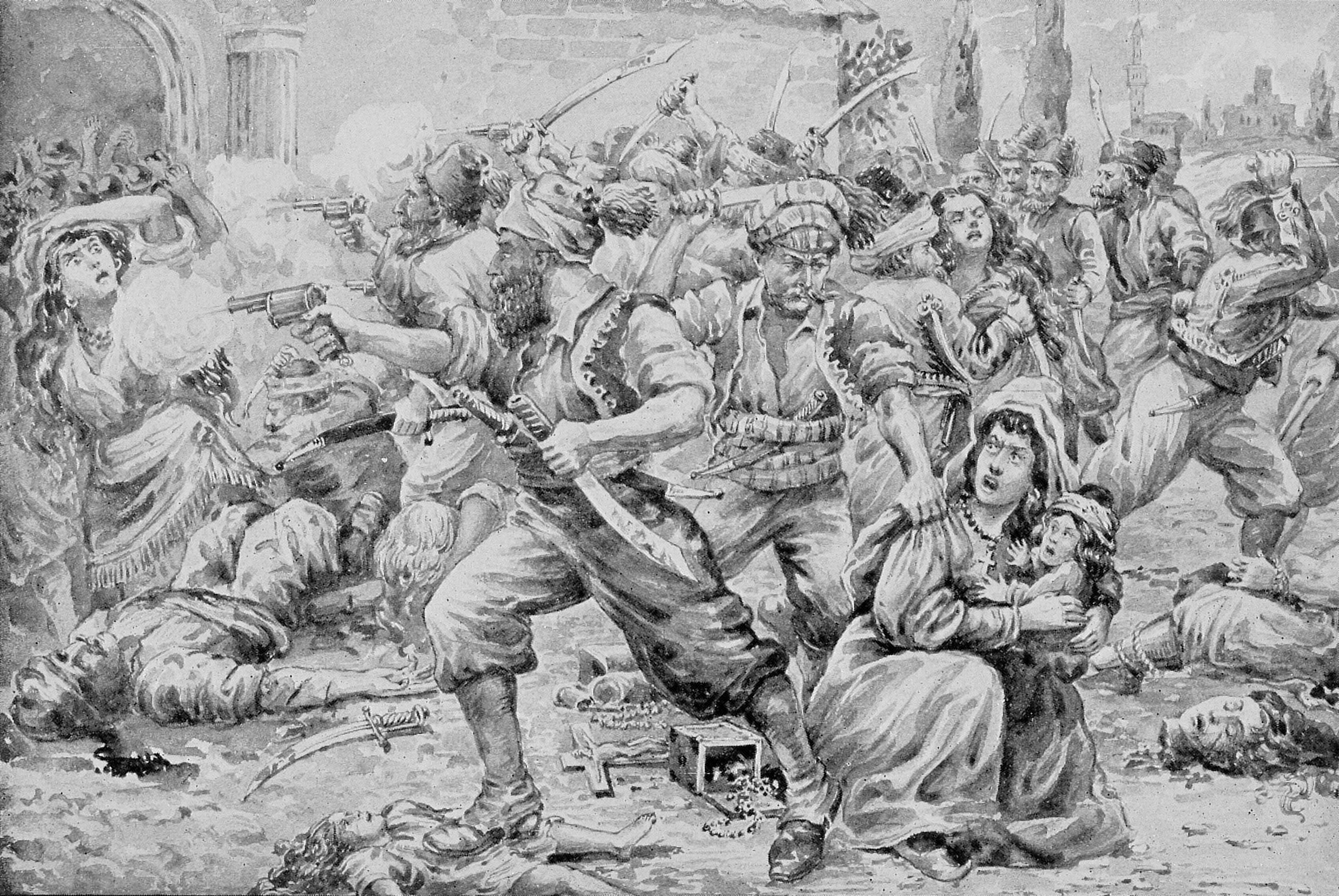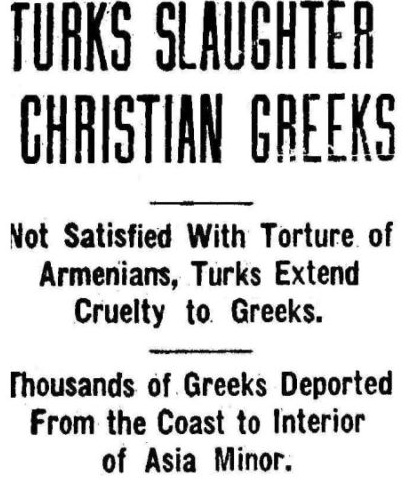|
Mark L. Bristol
Mark Lambert Bristol (April 17, 1868 – May 13, 1939) was a rear admiral in the United States Navy. Biography He was born on April 17, 1868, in Glassboro, New Jersey. Bristol graduated from the United States Naval Academy in 1887. During the Spanish–American War, he served aboard the battleship USS ''Texas'' and participated in the Battle of Santiago de Cuba. From 1901 to 1903, he served as aide to the Commander-in-Chief North Atlantic Fleet. He commanded the battleship USS ''Oklahoma'' during World War I. He served as the US High Commissioner in Turkey (1919–1927). His correspondence and other documents that he gathered are often cited during discussions on numerous events of that era, including Turkish-Armenian relations in which he played a significant role in his opposition to Armenian aspirations and American involvement in assuming a mandate in Armenia, Bristol was an antisemite who also hated the Greeks and the Armenians. His documents include writings such as ... [...More Info...] [...Related Items...] OR: [Wikipedia] [Google] [Baidu] |
Glassboro, New Jersey
Glassboro is a borough in Gloucester County, in the U.S. state of New Jersey. As of the 2010 U.S. census, the borough's population was 18,579,DP-1 – Profile of General Population and Housing Characteristics: 2010 for Glassboro borough, Gloucester County, New Jersey , . Accessed July 12, 2012. [...More Info...] [...Related Items...] OR: [Wikipedia] [Google] [Baidu] |
USS Oklahoma (BB-37)
USS ''Oklahoma'' (BB-37) was a built by the New York Shipbuilding Corporation for the United States Navy, notable for being the first American class of oil-burning dreadnoughts. Commissioned in 1916, ''Oklahoma'' served in World War I as a part of Battleship Division Six, protecting Allied convoys on their way across the Atlantic. After the war, she served in both the United States Battle Fleet and Scouting Fleet. ''Oklahoma'' was modernized between 1927 and 1929. In 1936, she rescued American citizens and refugees from the Spanish Civil War. On returning to the West Coast in August of the same year, ''Oklahoma'' spent the rest of her service in the Pacific. On 7 December 1941, during the Japanese attack on Pearl Harbor, several torpedoes from torpedo-bomber airplanes hit the ''Oklahomas hull and the ship capsized. A total of 429 crew died; survivors jumped off the ship into burning hot water or crawled across mooring lines that connected ''Oklahoma'' and . Some sailors ... [...More Info...] [...Related Items...] OR: [Wikipedia] [Google] [Baidu] |
General Board Of The United States Navy
The General Board of the United States Navy was an advisory body of the United States Navy, somewhat akin to a naval general staff and somewhat not. The General Board was established by general order 544, issued on March 13, 1900 by Secretary of the Navy John Davis Long. The order was officially recognized by Congress in 1916. The General Board was disbanded in 1951. Origins "The war with Spain had underlined the need for adequate staff work and the success of the War Board had pointed the way for the future. Among the most persistent advocates of a general staff for the Navy was Captain Henry C. Taylor. He had first laid plans for such a staff before Roosevelt in May 1897; now in 1900 he brought the idea once more to the attention of Secretary Long. Long, however, was reluctant to risk a fight with his entrenched bureau chiefs, hesitant about allowing the professional officers wide powers outside civilian control, and rightly dubious whether Congress could be brought to ap ... [...More Info...] [...Related Items...] OR: [Wikipedia] [Google] [Baidu] |
Asiatic Fleet
The United States Asiatic Fleet was a fleet of the United States Navy during much of the first half of the 20th century. Before World War II, the fleet patrolled the Philippine Islands. Much of the fleet was destroyed by the Japanese by February 1942, after which it was dissolved, and the remnants incorporated into the naval component of the South West Pacific Area (command), South West Pacific Area command, which eventually became the United States Seventh Fleet, Seventh Fleet. The fleet was created when its predecessor, the Asiatic Squadron, was upgraded to fleet status in 1902. In early 1907, the fleet was downgraded and became the First Squadron of the United States Pacific Fleet. However, on 28 January 1910, it was again organized as the Asiatic Fleet. Thus constituted, the Asiatic Fleet, based in the Philippines, was organizationally independent of the Pacific Fleet, which was based on the United States West Coast until it moved to Pearl Harbor in the Territory of Hawaii i ... [...More Info...] [...Related Items...] OR: [Wikipedia] [Google] [Baidu] |
Mustafa Kemal
Mustafa ( ar, مصطفى , Muṣṭafā) is one of the names of Prophet Muhammad, and the name means "chosen, selected, appointed, preferred", used as an Arabic given name and surname. Mustafa is a common name in the Muslim world. Given name Moustafa * Moustafa Amar, Egyptian musician and actor * Moustafa Bayoumi, American writer * Moustafa Chousein-Oglou, English actor * Moustafa Farroukh, Lebanese painter * Moustafa Madbouly, Prime Minister of Egypt * Moustafa Al-Qazwini, an Islamic Scholar and religious leader * Moustafa Reyadh, Egyptian football player * Moustafa Shakosh, Syrian football player * Moustafa Ahmed Shebto, Qatari athlete Moustapha * Moustapha Akkad, Syrian American film producer * Moustapha Alassane, Nigerien filmmaker * Moustapha Agnidé, Beninese football player * Moustapha Lamrabat (born 1983), Moroccan-Flemish photographer * Moustapha Niasse, Senegalese politician and diplomat * Abdul Moustapha Ouedraogo, Ivorian football striker * Moustapha Bayal Sall, ... [...More Info...] [...Related Items...] OR: [Wikipedia] [Google] [Baidu] |
Great Fire Of Smyrna
The burning of Smyrna ( el, Καταστροφή της Σμύρνης, "Smyrna Catastrophe"; tr, 1922 İzmir Yangını, "1922 Izmir Fire"; hy, Զմիւռնիոյ Մեծ Հրդեհ, ''Zmyuṙno Mets Hrdeh'') destroyed much of the port city of Smyrna (modern İzmir, Turkey) in September 1922. Eyewitness reports state that the fire began on 13 September 1922Horton, George. '' The Blight of Asia''. Indianapolis: The Bobbs-Merrill Company, 1926; repr. London: Gomidas Institute, 2003, p. 96. and lasted until it was largely extinguished on 22 September. It began four days after the Turkish military captured the city on 9 September, effectively ending the Greco-Turkish War, more than three years after the landing of Greek army troops at Smyrna on 15 May 1919. Estimated Greek and Armenian deaths resulting from the fire range from 10,000 to 125,000.Naimark, ''Fires of Hatred'', p. 52. Approximately 80,000 to 400,000 Greek and Armenian refugees crammed the waterfront to escape from the ... [...More Info...] [...Related Items...] OR: [Wikipedia] [Google] [Baidu] |
Anti-Armenian Sentiment
Anti-Armenian sentiment, also known as anti-Armenianism and Armenophobia, is hostility to, prejudice towards, or discrimination against towards Armenians, Armenia, and Armenian culture. Historically, anti-Armenianism has manifested in several ways, ranging from expressions of hatred of or discrimination against individual Armenians to organized pogroms by mobs or state-sanctioned genocide. Notable instances or persecution include the Hamidean massacres (1894-1897), the Adana massacre (1909), the Armenian genocide (1915), the Stalinist Great Purge (1936-1938), and the Sumgait pogrom (1988). Modern anti-Armenianism is often expressed by opposition to the actions or existence of an Armenian state, aggressive denial of the Armenian genocide or belief in an Armenian conspiracy to fabricate history and manipulate public and political opinion for political gain. Anti-Armenianism has also manifested as extrajudicial killing or intimidation of people of Armenian heritage and destruc ... [...More Info...] [...Related Items...] OR: [Wikipedia] [Google] [Baidu] |
Anti-Greek Sentiment
Anti-Greek sentiment (also known as Hellenophobia ( el, ελληνοφοβία, translit=ellēnophobía), anti-Hellenism, ( el, ανθελληνισμός, translit=anthellinismós), mishellenism ( el, μισελληνισμός, translit=misellēnismós), or Greek- bashing) refers to negative feelings, dislike, hatred, derision, racism, prejudice, and/or discrimination towards Greeks, the Hellenic Republic, and Greek culture. It is the opposite of philhellenism. Historic Ancient Rome In the mid- Republican period Rome phil-Hellenic and anti-Hellenic Roman intellectuals were involved in a conflict over Greek influence. One author explains, "the relationship of Romans to Greek culture was frequently ambiguous: they admired it as superior and adopted its criteria, while they remained skeptical of some aspects; hence they adapted it selectively according to their own purposes." An anti-Hellenic movement emerged in reaction to the primacy of Greek led by the conservative and reaction ... [...More Info...] [...Related Items...] OR: [Wikipedia] [Google] [Baidu] |
Antisemitism
Antisemitism (also spelled anti-semitism or anti-Semitism) is hostility to, prejudice towards, or discrimination against Jews. A person who holds such positions is called an antisemite. Antisemitism is considered to be a form of racism. Antisemitism has historically been manifested in many ways, ranging from expressions of hatred of or discrimination against individual Jews to organized pogroms by mobs, police forces, or genocide. Although the term did not come into common usage until the 19th century, it is also applied to previous and later anti-Jewish incidents. Notable instances of persecution include the Rhineland massacres preceding the First Crusade in 1096, the Edict of Expulsion from England in 1290, the 1348–1351 persecution of Jews during the Black Death, the massacres of Spanish Jews in 1391, the persecutions of the Spanish Inquisition, the expulsion from Spain in 1492, the Cossack massacres in Ukraine from 1648 to 1657, various anti-Jewish pogroms in the Russ ... [...More Info...] [...Related Items...] OR: [Wikipedia] [Google] [Baidu] |
Richard G
Richard is a male given name. It originates, via Old French, from Frankish language, Old Frankish and is a Compound (linguistics), compound of the words descending from Proto-Germanic language, Proto-Germanic ''*rīk-'' 'ruler, leader, king' and ''*hardu-'' 'strong, brave, hardy', and it therefore means 'strong in rule'. Nicknames include "Richie", "Dick (nickname), Dick", "Dickon", "Dickie (name), Dickie", "Rich (given name), Rich", "Rick (given name), Rick", "Rico (name), Rico", "Ricky (given name), Ricky", and more. Richard is a common English, German and French male name. It's also used in many more languages, particularly Germanic, such as Norwegian, Danish, Swedish, Icelandic, and Dutch, as well as other languages including Irish, Scottish, Welsh and Finnish. Richard is cognate with variants of the name in other European languages, such as the Swedish "Rickard", the Catalan "Ricard" and the Italian "Riccardo", among others (see comprehensive variant list below). People ... [...More Info...] [...Related Items...] OR: [Wikipedia] [Google] [Baidu] |
Wilsonian Armenia
Wilsonian Armenia () refers to the unimplemented boundary configuration of the First Republic of Armenia in the Treaty of Sèvres, as drawn by U.S. President Woodrow Wilson's Department of State. The Treaty of Sèvres was a peace treaty that had been drafted and signed between the Western Allied Powers and the defeated government of the Ottoman Empire in August 1920, but it was never ratified and was subsequently superseded by the Treaty of Lausanne. The proposed boundaries of Wilsonian Armenia incorporated portions of the Ottoman vilayets of Erzurum, Bitlis, Van, and Trabzon, which had Armenian populations of varying sizes. The inclusion of portions of Trabzon Vilayet was intended to provide the First Republic of Armenia with an outlet to the Black Sea at the port of Trabzon. A proposed Republic of Pontus was discussed at the Paris Peace Conference of 1919, but the Greek government of Eleftherios Venizelos feared the precarious position of such a state, so a portion of it wa ... [...More Info...] [...Related Items...] OR: [Wikipedia] [Google] [Baidu] |




